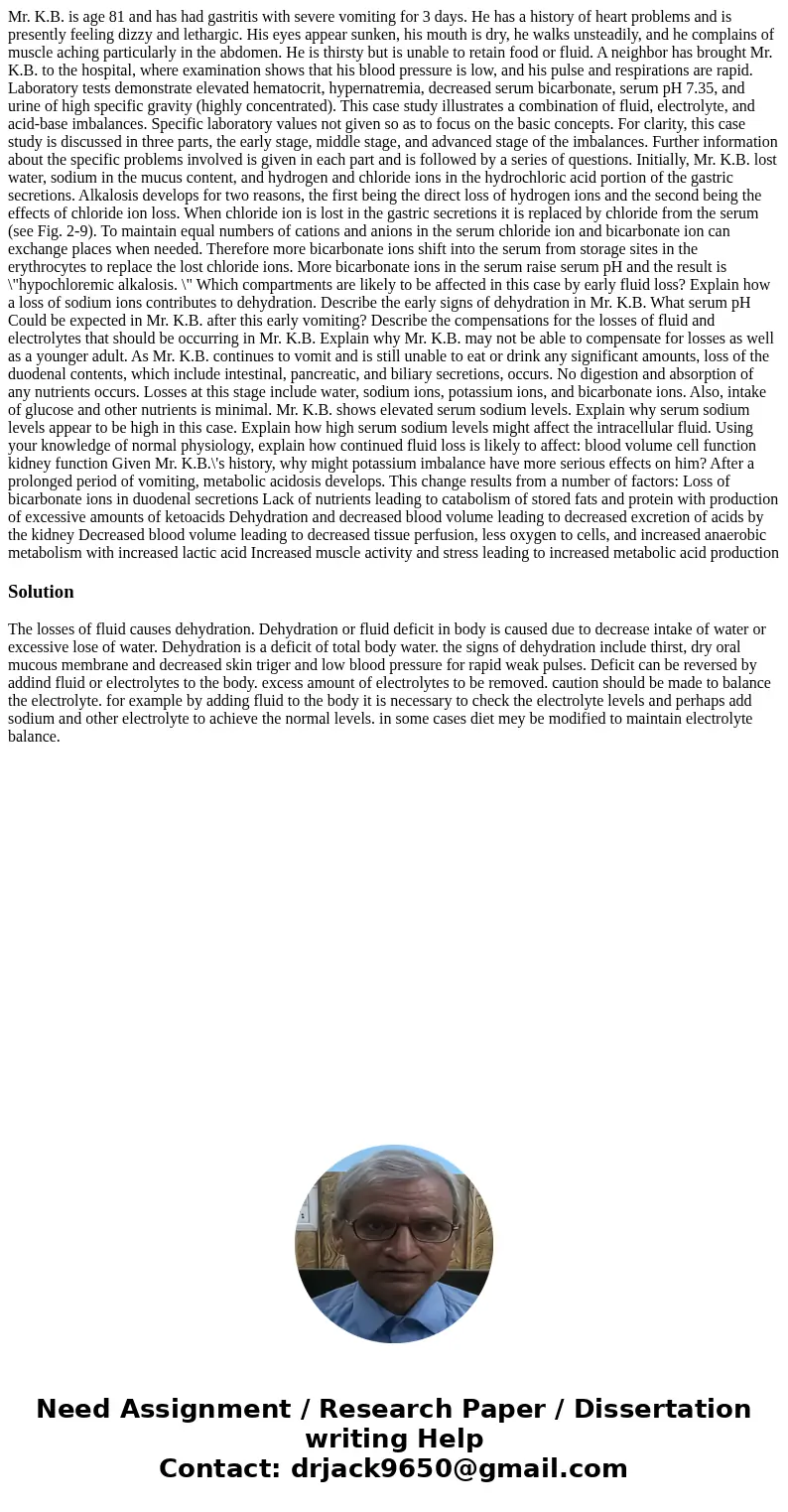Mr KB is age 81 and has had gastritis with severe vomiting f
Mr. K.B. is age 81 and has had gastritis with severe vomiting for 3 days. He has a history of heart problems and is presently feeling dizzy and lethargic. His eyes appear sunken, his mouth is dry, he walks unsteadily, and he complains of muscle aching particularly in the abdomen. He is thirsty but is unable to retain food or fluid. A neighbor has brought Mr. K.B. to the hospital, where examination shows that his blood pressure is low, and his pulse and respirations are rapid. Laboratory tests demonstrate elevated hematocrit, hypernatremia, decreased serum bicarbonate, serum pH 7.35, and urine of high specific gravity (highly concentrated). This case study illustrates a combination of fluid, electrolyte, and acid-base imbalances. Specific laboratory values not given so as to focus on the basic concepts. For clarity, this case study is discussed in three parts, the early stage, middle stage, and advanced stage of the imbalances. Further information about the specific problems involved is given in each part and is followed by a series of questions. Initially, Mr. K.B. lost water, sodium in the mucus content, and hydrogen and chloride ions in the hydrochloric acid portion of the gastric secretions. Alkalosis develops for two reasons, the first being the direct loss of hydrogen ions and the second being the effects of chloride ion loss. When chloride ion is lost in the gastric secretions it is replaced by chloride from the serum (see Fig. 2-9). To maintain equal numbers of cations and anions in the serum chloride ion and bicarbonate ion can exchange places when needed. Therefore more bicarbonate ions shift into the serum from storage sites in the erythrocytes to replace the lost chloride ions. More bicarbonate ions in the serum raise serum pH and the result is \"hypochloremic alkalosis. \" Which compartments are likely to be affected in this case by early fluid loss? Explain how a loss of sodium ions contributes to dehydration. Describe the early signs of dehydration in Mr. K.B. What serum pH Could be expected in Mr. K.B. after this early vomiting? Describe the compensations for the losses of fluid and electrolytes that should be occurring in Mr. K.B. Explain why Mr. K.B. may not be able to compensate for losses as well as a younger adult. As Mr. K.B. continues to vomit and is still unable to eat or drink any significant amounts, loss of the duodenal contents, which include intestinal, pancreatic, and biliary secretions, occurs. No digestion and absorption of any nutrients occurs. Losses at this stage include water, sodium ions, potassium ions, and bicarbonate ions. Also, intake of glucose and other nutrients is minimal. Mr. K.B. shows elevated serum sodium levels. Explain why serum sodium levels appear to be high in this case. Explain how high serum sodium levels might affect the intracellular fluid. Using your knowledge of normal physiology, explain how continued fluid loss is likely to affect: blood volume cell function kidney function Given Mr. K.B.\'s history, why might potassium imbalance have more serious effects on him? After a prolonged period of vomiting, metabolic acidosis develops. This change results from a number of factors: Loss of bicarbonate ions in duodenal secretions Lack of nutrients leading to catabolism of stored fats and protein with production of excessive amounts of ketoacids Dehydration and decreased blood volume leading to decreased excretion of acids by the kidney Decreased blood volume leading to decreased tissue perfusion, less oxygen to cells, and increased anaerobic metabolism with increased lactic acid Increased muscle activity and stress leading to increased metabolic acid production
Solution
The losses of fluid causes dehydration. Dehydration or fluid deficit in body is caused due to decrease intake of water or excessive lose of water. Dehydration is a deficit of total body water. the signs of dehydration include thirst, dry oral mucous membrane and decreased skin triger and low blood pressure for rapid weak pulses. Deficit can be reversed by addind fluid or electrolytes to the body. excess amount of electrolytes to be removed. caution should be made to balance the electrolyte. for example by adding fluid to the body it is necessary to check the electrolyte levels and perhaps add sodium and other electrolyte to achieve the normal levels. in some cases diet mey be modified to maintain electrolyte balance.
 Homework Sourse
Homework Sourse